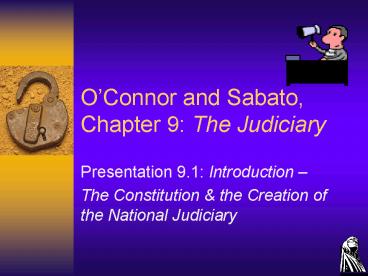OConnor and Sabato, Chapter 9: The Judiciary - PowerPoint PPT Presentation
1 / 18
Title:
OConnor and Sabato, Chapter 9: The Judiciary
Description:
... decided before 1800 (Chisum v. Georgia) John Jay (1745-1829) ... However, the commission was not delivered by Adam's Secretary of State. Wm. Marbury (1762-1835) ... – PowerPoint PPT presentation
Number of Views:74
Avg rating:3.0/5.0
Title: OConnor and Sabato, Chapter 9: The Judiciary
1
OConnor and Sabato,Chapter 9 The Judiciary
- Presentation 9.1 Introduction
- The Constitution the Creation of the National
Judiciary
2
Key Topics
- Introduction
- The Constitution and the Creation of the National
Judiciary
John Marshall (1955-1835), Picture courtesy
Encarta.
3
Introduction
- The role of the Supreme Court in deciding the
outcome of the 2000 presidential election - Calls for oral arguments to be televised
- The Courts resistance to such publicity
2000 presidential election protesters in Seattle,
WA. Picture courtesy www.seattlevotermarch.com.
How independent is the federal judiciary?
4
1i. Introduction cont.
- Alexander Hamilton the judiciary would be the
least dangerous branch of the national govt. - Do you agree that the judiciary is an apolitical
and weak branch of government? - What role should the federal courts play in the
governing process?
What should happen when judges overstep their
judicial boundaries?
5
2. The Constitution and the Creation of the
National Judiciary
- The brevity of Article III
- The anti-federalists fears of an independent
judiciary whose members had life tenure - Feared that federal judges power to interpret
the Constitution would lead to tyranny
Many contemporary political theorists echo the
anti-federalists concerns. Is the Supreme Court
an anti-democratic institution?
6
2i. The Constitution and the Courts
- Congress was empowered to create inferior federal
courts - Federal judges given life tenure with good
behavior - The need for independent judges to guard the
Constitution - Judiciarys role in impeachment is established in
Article I, sec. 3
7
2a. The Judiciary Act of 1789 the Creation of
the Federal Judicial System
- Established a three-tiered structure
- Lowest courts were called federal district courts
- Middle tier were called circuit courts
- Supreme Court as the highest court in the land
The Constitution is silent on the composition of
the Supreme Court, which has gone from its
original six to 15 members. Since 1869, the Court
has been comprised of 9 justices.
8
2ai. The First Sessions
- John Jay was nominated by Washington as the 1st
chief justice - The courts ineffectual early history
- Only one important case decided before 1800
(Chisum v. Georgia)
John Jay (1745-1829). Picture courtesy
www.americanrevolution.org.
9
2aii. Early Sessions
- Important early decision by the Court to avoid
political questions - Jay left the court in 1795 to head a diplomatic
commission, then became governor of NY
The Supreme Court had no formal building of its
own until 1935, and heard cases in the basement
of the old Senate. Picture courtesy
Bettmann/Corbis.
10
2aiii. Early Sessions
- Jay, asked by Washington to resume the chief
justice position, declined - The institution lacks weight, energy, and
direction - One member of the federal Supreme Court resigned
his post to become chief justice of the South
Carolina supreme court
Prior to the mid-19th century, Washington, D.C.
was a pretty dingy and boring place to live, and
most politicians preferred to return to their
home states.
11
2b. The Marshall Court (1801-1835)
- Marshalls elevation to the chief justice
position transformed the Court - Established the power of Judicial review (more
below) - Abandoned the practice of each justice issuing
per curiam decisions on each case - Enabled to Court to speak with one voice
12
2c. Judicial Review
- The Framers had considered and rejected the idea
of a judicial veto - However, they did include Article VI, which
contained the supremacy clause - Alexander Hamilton first endorsed the idea of
judicial review in Federalist 78 - Marbury v. Madison (1803) established the
principle of judicial review
13
2ci. Marbury v. Madison (1803)
- The result of a political controversy over the
final days of the Adams administration - The outgoing Federalists passed the Judiciary
Act, creating many new judicial posts, a few days
before the expiration of the legislative session - The Midnight Appointments Adams filled all the
posts before his term expired
The incoming president, Thomas Jefferson, was
furious over the outgoing Federalists efforts to
pack the courts with federalist judges.
14
2cii. Marbury cont.
- William Marbury was appointed to become justice
of the peace for the District of Columbia - However, the commission was not delivered by
Adams Secretary of State
Can you name Adams Secretary of State?
Wm. Marbury (1762-1835). Picture unknown.
15
2ciii. Marbury cont.
- Marbury requested that Thomas Jeffersons Sec. of
State deliver the commission - Sec. of State James Madison, under instructions
from Jefferson, refused - Marbury and other Adams appointees filed a writ
of mandamus requesting the Supreme Court order
Madison to deliver the commissions
16
2civ. The Stakes in the Case
- Marshall was a strident critic of Jefferson (who
was his cousin) - Marshall wanted to order the president to deliver
the commissions - However, he knew that the courts reputation
would suffer if the president refused
Jefferson had publicly vowed to reject any order
by the Supreme Court, and Marshall knew that the
Courts influence, in comparison with the
presidency, was modest.
17
2cv. The Decision
- Marshall concluded that, although the applicants
had a valid claim, the Court lacked the authority
to issue a writ - Ruled that parts of the Judiciary Act of 1789
that extended the power to issue such writs were
inconsistent w/ the Constitution and therefore
unconstitutional - Established the principle of judicial review
18
2cvi. John Marshall
- It is emphatically the province and the duty of
the judicial department to say what the law is - Although Jefferson didnt like the decision, he
accepted its conclusions































